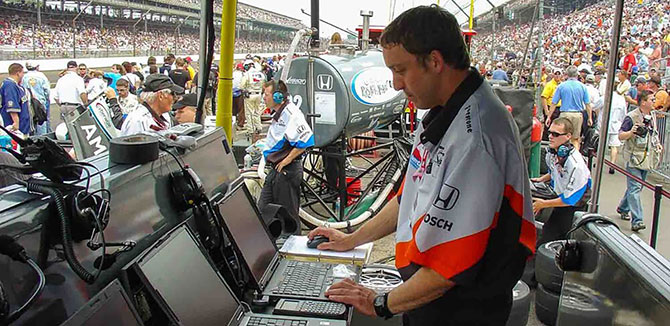From the Race Track to the Classroom
Alex Castrounis knows all about high-speed careers. His near decade of doing AI work with IndyCar is now benefiting students in the MBAi program's Applied AI for Business course.

Alex Castrounis is preparing students for a career in the fast lane of artificial intelligence (AI). He is exceedingly familiar with that pace.
Castrounis is a former IndyCar engineer, race strategist, and data scientist. His work with AI helped the sport’s luminaries like Michael Andretti, Danica Patrick, and Will Power find millisecond advantages amidst the deluge of data their cars produced to turn a middle-of-the-pack finish into a trip to victory lane.
Today, Castrounis is the founder and CEO of the AI strategy design consulting firm Why of AI.
He also teaches a core AI course in Northwestern's MBAi Program, a joint-degree program offered between the Kellogg School of Management and the McCormick School of Engineering. That course, Applied AI for Business, grounds students in the fundamentals of the field and its growing role in companies’ success.
“One of the cool things about MBAi is that Northwestern, McCormick, and Kellogg pioneered this new MBA geared toward tomorrow's tech-savvy and data-and-analytics-savvy business leaders,” said Castrounis, who has been with the program since its inception four years ago. “I couldn't be more excited to be with the program.”
Castrounis brings to the classroom more than two decades of experience advising companies of all sizes — from startups to Fortune 100 — to use data, analytics, and AI models to drive business growth and customer success. For nearly half of his career, helping others drive well was literally the guiding benchmark.
Castrounis was involved in more than 100 IndyCar races, including multiple appearances at the sport’s premier event — the Indianapolis 500. In his final role with the sport, he served as head of vehicle dynamics and data science at Andretti Autosport, the racing team owned by legendary former driver Michael Andretti.
Each IndyCar has more than 80 sensors that record and transmit data that is analyzed in real-time. One car can create more than 500 billion data points in one race alone, Castrounis said.
Understanding what data mattered and how it can create the biggest advantage was paramount to his success on the track. Knowing how to make that delineation and apply it to what it takes to win with data and advanced analytics in business is what he now teaches MBAi students.
Castrounis looks at AI through two different lenses in his course.
The engineering lens helps students develop a broad technical knowledge, understanding, and appreciation of the complexity that comes with building real-world AI solutions. He wants students to develop AI literacy and fluency without doing a deep dive into the inner workings of the algorithms and equations.
The second lens focuses on the business side of AI.
“It is great that we have these tools like artificial intelligence and machine learning, but the real questions become, ‘Why do you need these tools, and what can you do with them?’” he said. “What are the benefits of using them, and how can they benefit organizations, people, humanity, customers, and end users?”
That two-pronged approach to AI – teaching the technical aspects of AI alongside its business applications – is at the core of the MBAi program.
One of Castrounis’ main goals is to ensure students have a broad view of how AI can create significant positive benefits for both people and businesses. Contrary to public opinion, AI is far more than just large language models or generative AI applications like ChatGPT, he said.
“There's computer vision, natural language processing, predictive analytics forecasting, clustering, anomaly detection, and the list just goes on and on,” he said. “A lot of the business side of the course I teach is designed to really talk about what the stuff is and how it works, but also how you use it to truly solve real problems in the real world.”
With how fast AI is advancing, Castrounis’ course is constantly changing.
"AI moves really quickly. The good thing about having a few years under my belt is that you get great feedback and you learn a lot,” he said. “Every new cohort benefits from the previous cohorts, and the course just keeps evolving.”
